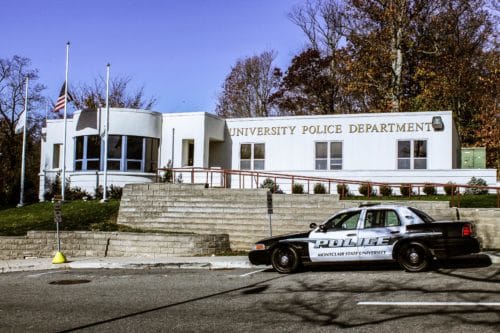
Officers Ron DeWitt, Jeff Struble and Andrew Burde (not pictured) will receive the Life Saving Award from UPD.
Photo Credit: Carly Phelps
On a late November morning, the University Police Department received a call reporting a “non- responsive” and “non-breathing” male construction worker who appeared to have suffered a major heart episode in Partridge Hall.
Police officers Ron DeWitt, Jeff Struble and Andrew Burde responded immediately and found that the man had no heartbeat and was beginning to turn blue.
DeWitt and Burde began CPR compressions and rescue breaths. After continuing this for five cycles and approximately 15 minutes, DeWitt and Burde was still unresponsive. After the ineffective CPR, Struble cleared all CPR and used an automated external defibrillator (AED). The AED provided a shock to the chest at which point a pulse was detected and the man began breathing again.
DeWitt and Burde continued CPR until Emergency Medical Services (EMS) arrived and took the man to St. Joseph’s Hospital in Paterson. The patient underwent emergency surgery for a heart defect and, according to police, is recovering well.
“It made me feel honored to help save a life, and while it is part of what we do, I was thankful in a way for my own family and his family as well as we sometimes take it for granted that we never know where the day will take us,” DeWitt told The Montclarion.
DeWitt, Struble and Burde will be honored with a Life Saving Award from the University Police Department for their helping the construction worker.
“Had it not been for the efforts of these officers, this man would have died,” said Captain Keiran Barrett of UPD. “Their quick and decisive action saved a life.”
Dispatcher Sylvia Sims will also be recognized for her getting the officers to the scene quickly. Without her, none of these officer’s actions would have been successful or timely.
Later that day, Struble responded to another emergency situation, when a university employee was choking on food. He applied the Heimlich maneuver which dislodged the food causing airway obstruction and, for the second time that day, helped someone who was in dire need of medical attention.
“Our officers take great pride in their service to the community when it comes to emergencies and it is our hope that people know the good work that they do each and every day on this campus,” said Barrett. “These may be unique examples of life saving action, but the women and men serving in this agency make a daily effort to ensure this is a safe environment that has a great attention to response and decisive action.”


